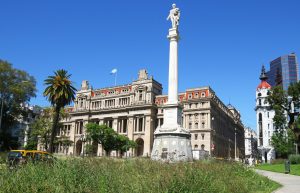A court in Argentina on Friday issued an arrest warrant for Senior Gen. Min Aung Hlaing, the head of Myanmar’s military junta, for his role in alleged “genocide and crimes against humanity” against the Rohingya minority group.
The court’s decision, which has not yet been made public but has been reported widely in the media, also lists 22 other military officials, including Soe Win, the deputy commander-in-chief. In addition, warrants have been issued for two civilian leaders, former State Counselor Aung San Suu Kyi and former President Htin Kyaw.
In her ruling issued on Thursday, Judge Maria Servini said that the allegations listed in the complaint “constitute crimes that violate human rights recognized in various international criminal law instruments, subscribed to by most countries in the world,” the AFP news agency reported.
These included “internationally known crimes such as genocide and crimes against humanity, committed by the political and military authorities in power in that country.”
The crimes refer to the brutal “clearance operation” that the Myanmar military launched in Rakhine State in August 2017, following scattered attacks by Rohingya militant groups. The offensive, which has been described both as a potential “genocide” and a “textbook case of ethnic cleansing,” saw Myanmar soldiers and local vigilantes kill at least 6,700 people and expel more than 740,000, while shooting livestock and torching dozens of villages.
The Argentinian case was filed in 2019 under the principle of “universal jurisdiction,” which allows the victims to bring charges in foreign courts against “particular crimes of international concern, no matter where the crime was committed, and regardless of the nationality of the perpetrators or their victims.” An Argentine court accepted the case in November 2021. Rohingya victims and legal advocacy groups have also initiated universal jurisdiction cases against the Myanmar military in the Philippines, Turkey, and Indonesia, addressing both the crimes committed against the Rohingya and other atrocities committed since the military coup of February 2021. The actions of Myanmar’s generals are also under investigation by the International Court of Justice (ICJ) and International Criminal Court, which announced in November that it was requesting its own arrest warrant for Min Aung Hlaing, with the promise of more to come.
In a statement on Friday, the Burmese Rohingya Organisation U.K. (BROUK), which filed the initial complaint in 2019, praised the Argentinian court’s ruling as a “historic step towards justice for Rohingya and everyone in Burma suffering under the Burmese military.”
“This courageous decision by the Argentinian judiciary sends a clear signal to Min Aung Hlaing and other officials that no one is above the law,” he said.
The most notable (and controversial) aspect of the Argentinian court’s decision is obviously the inclusion of Aung San Suu Kyi and Htin Kyaw among the rota of military brass who were alleged to be directly responsible for the assaults on the Rohingya.
The two occupied the senior-most civilian leadership positions in Myanmar at the time of the assaults against the Rohingya, and both have long been accused, variously, of abetting, defending, or downplaying the extent of the attacks on the Rohingya. In September 2017, Aung San Suu Kyi’s office blamed “terrorists” for “a huge iceberg of misinformation” around the situation in Rakhine State. The Nobel laureate later traveled to The Hague to defend her nation at the ICJ, in the genocide case brought by The Gambia.
However, the true extent of Aung San Suu Kyi’s culpability has been the subject of hot debate, and the events that have taken place – the 79-year-old has been in the military’s custody since the coup – have for some cast the issue in a different light.
In its statement, BROUK said that it only requested arrest warrants for military officials, and that the Argentinian Prosecutor independently decided to include the two civilian leaders. In response, BROUK made a formal request to the court asking it “to consider the current political context in Burma and whether issuing arrest warrants for Aung San Suu Kyi and Htin Kyaw serves the best interests of justice at this time.” It says that its request was dismissed.

































